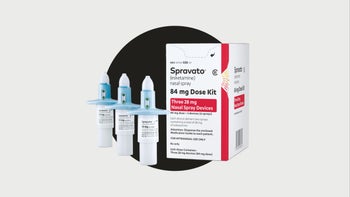
9 Antipsychotic Side Effects You Should Know About
Key takeaways:
Antipsychotics are medications used to treat mental health conditions like schizophrenia, bipolar disorder, and depression.
Mild antipsychotic side effects include sleep changes, dry mouth, and sexual problems. Antipsychotics can also cause long-term effects like weight gain, raised cholesterol,and raised blood glucose (sugar).
Serious antipsychotic side effects include abnormal heart rhythms and tardive dyskinesia (TD). Very rarely, antipsychotics can cause neuroleptic malignant syndrome (NMS), a side effect that requires immediate medical attention.
Access savings on related medications
Table of contents

Antipsychotics are a class of medications that can treat mental health conditions like schizophrenia and bipolar disorder. They can also be prescribed for depression when antidepressants aren’t working well enough.
Antipsychotics can be split into two groups: typical (first generation) and atypical (second generation). The two groups work a bit differently and can cause different side effects.
Below, you’ll find details on nine notable antipsychotic side effects. Just keep in mind that the risk of certain side effects varies between individual medications.
Search and compare options
1. Sleep changes
Antipsychotics can cause sleep changes. This could mean either drowsiness or trouble sleeping.
Overall, drowsiness tends to be more common with these medications. Quetiapine (Seroquel), olanzapine (Zyprexa), and clozapine (Clozaril) are three antipsychotics that commonly cause drowsiness. Aripiprazole (Abilify), on the other hand, tends to cause trouble sleeping.
Many antipsychotics have once-daily dosage options. If you find that your antipsychotic makes you sleepy, try taking your dose at night. If your medication makes it hard to fall asleep, take your dose in the morning. This can help you avoid disruptions to your daily routine.
If you’re taking more than one dose per day and having sleep issues, talk to your healthcare provider or pharmacist about your ideal dosage timing or a once-daily option.
2. Dry mouth
Dry mouth is another common antipsychotic side effect. Antipsychotics block a chemical in the body called acetylcholine. When acetylcholine is blocked, a number of symptoms (called anticholinergic side effects) can occur. Dry mouth is one of the most common.
Dry mouth is more common with typical antipsychotics, like haloperidol (Haldol), than atypical antipsychotics. To help make dry mouth more tolerable, try sucking on ice chips or sugar-free candy. Staying hydrated throughout the day will also help. And brushing and flossing your teeth at least twice a day can help prevent long-term dental problems caused by dry mouth.
Read more like this
Explore these related articles, suggested for readers like you.
Good to know: The atypical antipsychotic clozapine can actually have the opposite effect to dry mouth. It’s common for people taking it to experience drooling.
3. Weight gain
Many antipsychotics can cause changes to your metabolism. Weight gain is one possible metabolic side effect. But not all antipsychotics carry the same risk of weight gain. Most atypical antipsychotics have a higher risk of weight gain than typical antipsychotics.
Antipsychotics can interfere with natural signals your body sends out when you’re full. This can make you feel hungrier and cause you to eat more than usual. Atypical antipsychotics can also cause your body to make more fat cells.
If you’re concerned about weight gain with antipsychotics, speak with your healthcare provider. They can help you develop a plan for maintaining a body weight that’s comfortable for you. They may also suggest an alternative antipsychotic that’s less likely to cause weight gain. And if needed, you can discuss whether weight loss medications would be appropriate for you.
4. Raised cholesterol
Another possible metabolic side effect of antipsychotics is raised cholesterol. In fact, people taking antipsychotics are almost three times more likely to develop high cholesterol than people not taking them. Over time, high cholesterol can raise your risk of heart-related problems, including heart attack and stroke.
While not fully understood, researchers think weight gain from antipsychotics may contribute to higher cholesterol levels. Antipsychotics may also slow the breakdown of cholesterol in the body. Clozapine, olanzapine, and quetiapine seem to have the highest risk for raising cholesterol levels.
Certain dietary changes can help lower cholesterol levels. Adding regular exercise to your routine can also help. Your healthcare provider may check your blood cholesterol levels while you’re taking antipsychotics. If your levels start to get too high, they may prescribe a cholesterol medication to help lower them.
5. Raised blood glucose
Raised blood glucose (sugar) is a third metabolic side effect that can happen with antipsychotics. In some cases, this leads to the development of Type 2 diabetes. Almost all antipsychotics increase the risk of raised blood glucose. But clozapine and olanzapine have the highest risk, while aripiprazole has the lowest.
There are a few reasons why this side effect may occur. Weight gain from antipsychotics can raise your risk of blood glucose changes long term. But antipsychotics can also cause insulin resistance, meaning your body doesn’t respond as well to its natural insulin.
Having a plan for managing blood glucose changes is a good idea when taking antipsychotics long term. For some people, a diabetes-friendly diet and regular exercise can help balance glucose levels. If your glucose levels get too high, your healthcare provider may recommend taking certain diabetes medications, such as metformin. Discuss the best ways to limit this antipsychotic side effect with your provider.
6. Sexual side effects
Antipsychotics can also cause sexual side effects, including erectile dysfunction and low sex drive (low libido). Typical antipsychotics are more likely to cause these issues than atypical antipsychotics. Out of the atypical antipsychotics, risperidone (Risperdal) has the highest risk of sexual side effects.
Discuss any sexual side effects you develop with your healthcare provider. In some cases, they may suggest switching to an antipsychotic with a lower risk of these side effects. They may also suggest medications, such as erectile dysfunction medications, to help alleviate them.
7. Movement-related side effects
Extrapyramidal symptoms (EPS) are uncontrollable body movements caused by some antipsychotics. They’re more common with typical antipsychotics like haloperidol. But they can happen with atypical antipsychotics, too. Risperidone is an atypical antipsychotic with a higher risk of EPS.
These movement-related side effects can include:
Feeling restless or unable to sit still (akathisia)
Tremors similar to those seen with Parkinson’s disease (parkinsonism)
Abnormal body twisting, flexing, or stiffening (dystonia)
Uncontrollable movements of the face, arms, or trunk (tardive dyskinesia, or TD)
Of these potential side effects, TD is often the most concerning. In many cases, stopping treatment or lowering the dose of an antipsychotic can help relieve EPS. There are also medications that can decrease the severity of this side effect. But TD can become permanent. It can also interfere with activities like talking, eating, and breathing.
If you experience any uncontrollable muscle movements while taking an antipsychotic, contact your healthcare provider. They’ll likely want to evaluate your symptoms. If needed, they can make adjustments to your current dosage. But you shouldn’t make any changes without your provider’s OK.
8. Abnormal heart rhythms
Some antipsychotics can cause abnormal heart rhythms (arrhythmias). In rare cases, this could be life-threatening. Your risk for arrhythmias goes up if you also take other medications that have this side effect.
Not all antipsychotics have the same risk when it comes to arrhythmias. Some, such as thioridazine, carry a higher risk. Others, such as aripiprazole, carry a lower risk. Depending on your unique situation, your healthcare provider may monitor your heart rhythm from time to time at checkups.
The best way to lower your risk of this side effect is to give your provider and pharmacist an updated medication list. They can use this list to make sure other medications you take aren’t raising your risk for abnormal heart rhythms. If you experience lightheadedness, fainting, or a feeling of your heart skipping beats, contact your provider. These can be symptoms of arrhythmias.
9. Neuroleptic malignant syndrome
Neuroleptic malignant syndrome (NMS) is a rare, but potentially life-threatening antipsychotic side effect. In the past, experts believed typical antipsychotics had a greater risk of NMS than atypical antipsychotics. But more recent evidence suggests the risk is similar for all antipsychotics.
Potential symptoms of NMS include:
Rigid muscles
Fever
Confusion
Changes to heart rate, blood pressure, and breathing
NMS is a medical emergency. If you experience the symptoms listed above while taking an antipsychotic, go to the nearest emergency room.
Which antipsychotics have the most side effects?
All antipsychotics can cause side effects. And everyone’s experience is unique. Be open with your healthcare provider about any side effects you’re having and if they’re too bothersome for you. It may take several tries to find an antipsychotic that works well for you and has manageable side effects.
Below, you’ll find a quick guide to antipsychotic side effects and which medications have a higher risk of causing them.
| Side effect | Typical antipsychotics | Atypical antipsychotics |
|---|---|---|
| Drowsiness |
|
|
| Dry mouth |
|
|
| Weight gain |
|
|
| Raised cholesterol |
|
|
| Raised blood glucose |
|
|
| Sexual side effects |
|
|
| Movement-related side effects |
|
|
| Abnormal heart rhythms |
|
|
| Neuroleptic malignant syndrome (NMS) |
|
|
The bottom line
Typical and atypical antipsychotics treat mental health conditions like schizophrenia and bipolar disorder. Both groups of antipsychotics have unique risks for side effects. In general, typical antipsychotics are more likely to cause most side effects.
Mild antipsychotic side effects include sleep changes, dry mouth, and sexual problems. Atypical antipsychotics can also cause changes to your metabolism. This can lead to weight gain, raised cholesterol levels, and higher blood glucose (sugar).
Rare but serious antipsychotic side effects include tardive dyskinesia (TD), abnormal heart rhythms, and neuroleptic malignant syndrome (NMS). Seek immediate medical care if you’re having symptoms of a serious antipsychotic side effect.
Why trust our experts?



References
American Psychiatric Association. (2021). Practice guideline for the treatment of patients with schizophrenia.
Carli, M., et al. (2021). Atypical antipsychotics and metabolic syndrome: From molecular mechanisms to clinical differences. Pharmaceuticals.
Chen, J., et al. (2017). Molecular mechanisms of antipsychotic drug-induced diabetes. Frontiers in Neuroscience.
Croy, D. S., et al. (n.d.). Clinical feature: Dyslipidemia and antipsychotic medications: Who is monitoring the lipids? National Lipid Association.
D’Souza, R. S., et al. (2023). Extrapyramidal symptoms. StatPearls.
De Boer, M. K., et al. (2015). The facts about sexual (dys)function in schizophrenia: An overview of clinically relevant findings. Schizophrenia Bulletin.
Farzam, K., et al. (2023). OT prolonging drugs. StatPearls.
Funk, M. C., et al (2018). Resource document on QTc prolongation and psychotropic medications. American Psychiatric Association.
Holt, R. I. G. (2019). Association between antipsychotic medication use and diabetes. Current Diabetes Reports.
Lewis, K., et al. (2023). Dystonic reactions. StatPearls.
Muench, J., et al. (2010). Adverse effects of antipsychotic medications. American Family Physician.
Patel, J., et al. (2023). Akathisia. StatPearls.
Pillinger, T., et al. (2019). Comparative effects of 18 antipsychotics on metabolic function in patients with schizophrenia, predictors of metabolic dysregulation, and association with psychopathology: A systematic review and network meta-analysis. The Lancet.
Purves, D., et al. (2001). Acetylcholine. Neuroscience.
Rowland, T., et al. (2018). Neuroleptic malignant syndrome: A focus on risk, recognition and antipsychotic re-challenge. Primary Health Care.
Shrimanker, I., et al. (2022). Parkinsonism. StatPearls.
For additional resources or to connect with mental health services in your area, call SAMHSA’s National Helpline at 1-800-662-4357. For immediate assistance, call the National Suicide Prevention Lifeline at 988, or text HOME to 741-741 to reach the Crisis Text Line.





























